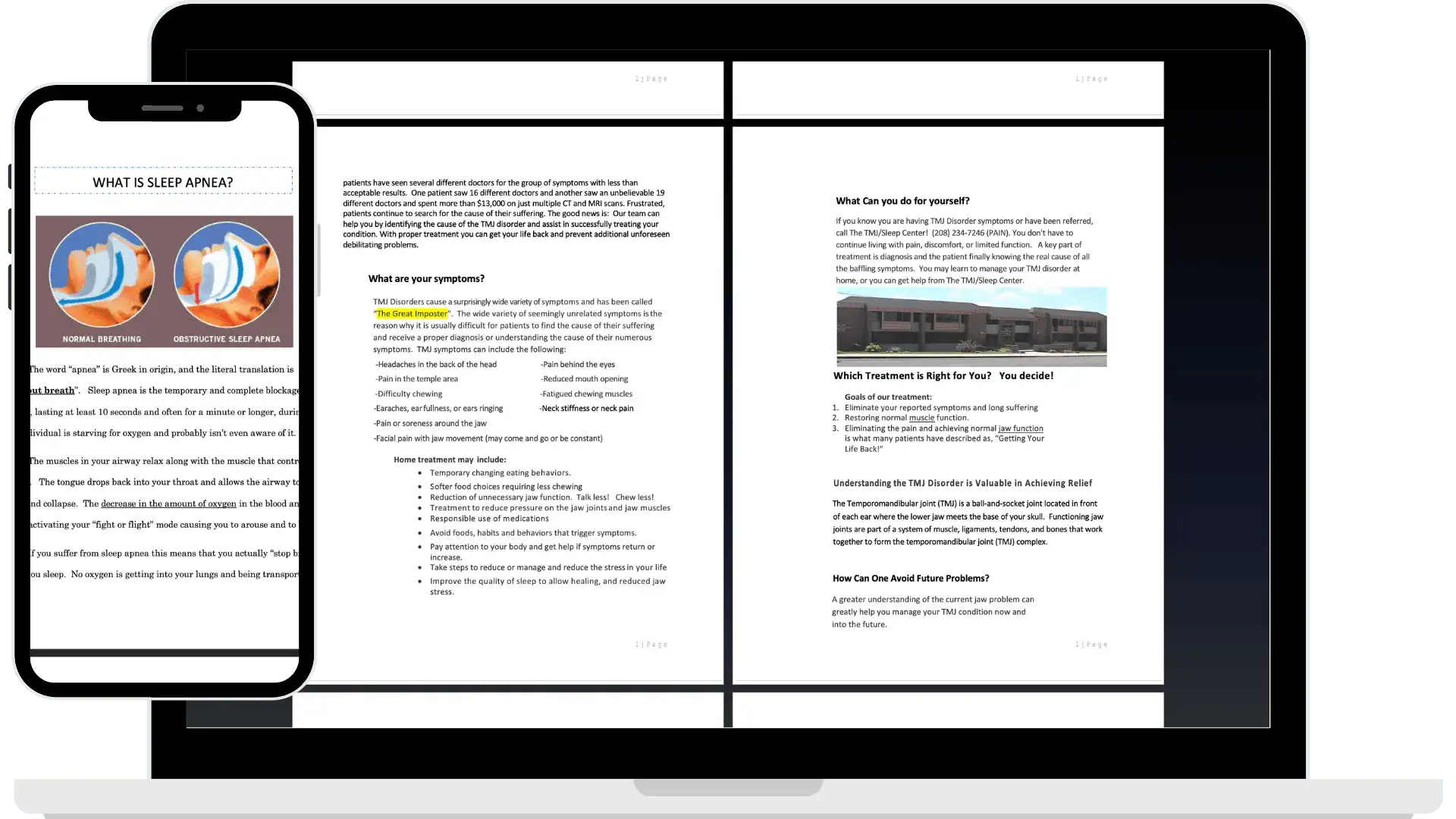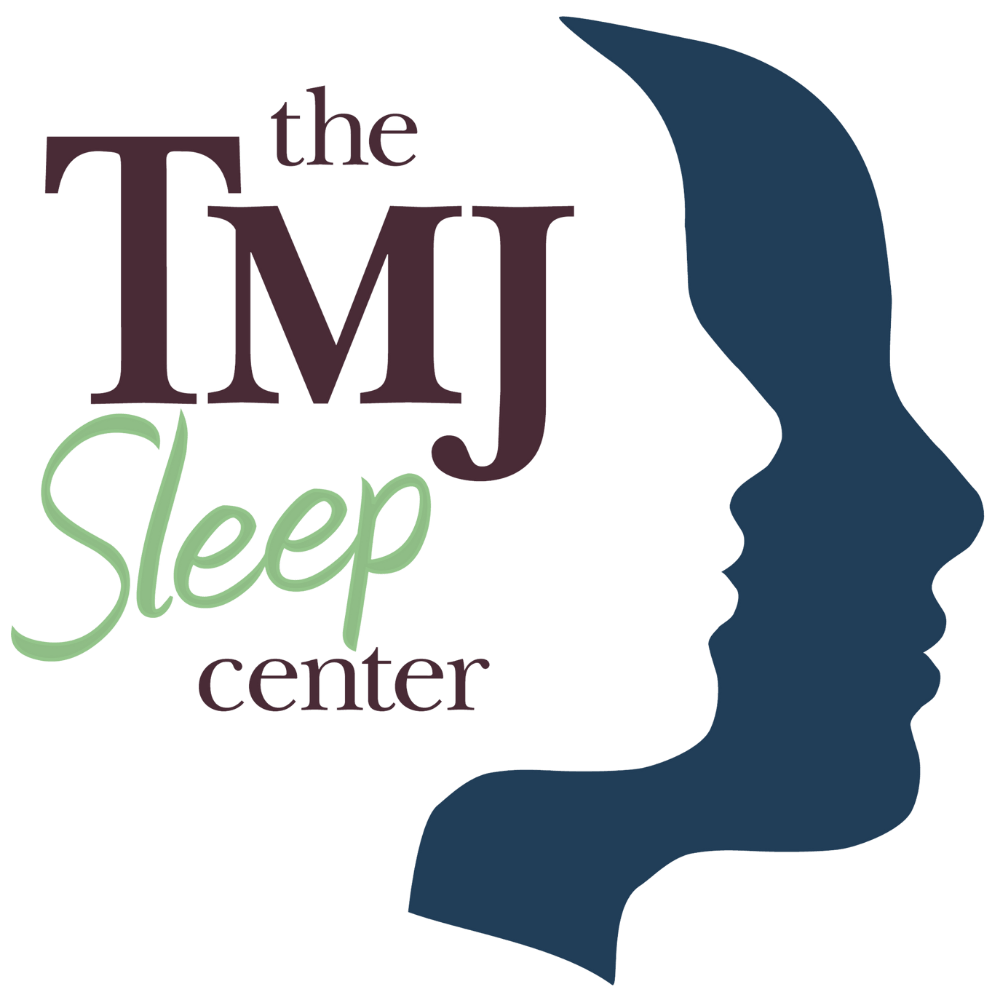Sleep Apnea Solutions
Free Consultations
Walk-Ins Welcome
Work With All Insurance
Hours:
Identifying Disorders That Impact Sleep
Breathing problems while you sleep are a symptom of sleep apnea. An apnea is a brief cessation of breathing and, when it occurs while you’re sleeping, it can damage your sleep quality, lower your body’s oxygen levels, and worsen other health issues.
At The TMJ Sleep Center, our main purpose of sleep apnea testing is to identify respiratory disorders that affect sleep, such as central or obstructive sleep apnea. Most sleep apnea testing concentrates on obstructive sleep apnea (OSA) because it is far more prevalent and can have major health effects. If you suspect that you may have sleep apnea, come into our sleep center in Pocatello for testing. We’ll evaluate you and see what treatment options are right for you.
Testing that gauges breathing during sleep is necessary to determine the presence of sleep apnea. Through this testing, breathing disturbances can be confirmed and their frequency and seriousness can be evaluated. If various problems or anomalies are hurting your sleep, some sleep apnea testing may also be able to help.
Testing for sleep apnea is also used to improve care. Continuous positive airway pressure (CPAP) devices supply a steady stream of air via the nose or mouth to prevent the airway from collapsing and are a typical treatment for obstructive sleep apnea. Testing can assist in CPAP titration, the process of calibrating the pressure of a CPAP machine. Many people use a CPAP to treat their sleep apnea but cannot tolerate it. We provide alternatives to CPAP for sleep apnea.
Call for an appointment or visit us today. Walk-ins are welcome. Be sure to ask about how to get a free consultation, free estimate, and a free patient consumer guide.
We work with all insurance companies regarding treatment.
Who Should Be Tested?
People who exhibit symptoms consistent with a potential sleep-related respiratory issue often undergo sleep apnea testing as part of the diagnostic procedure. Obstructive sleep apnea’s main symptoms are:
- Excessive afternoon sleepiness
- Loud snoring that occurs frequently
- Choking or gasping when sleeping
When someone has other OSA risk factors, such as obesity or high blood pressure, testing is frequently more likely to be advised. The diagnostic approach for a variety of other illnesses that can significantly contribute to daytime drowsiness includes OSA testing.
As part of the diagnosis, treatment, and monitoring of sleep apnea, a variety of test types may be employed. The main test for sleep apnea is an overnight sleep study known as a polysomnogram. However, other procedures are typically used in patient evaluation, including:
Health Review and Physical Examination
A physical examination and a discussion of your current health and medical history are part of the initial evaluation for sleep apnea. During the physical examination, a doctor checks for anatomical features like a big tongue or a blocked nose that could contribute to a restricted airway in the throat.
Questionnaires for Sleep Apnea
Doctors might employ some particular questionnaires that have been created as part of the examination of symptoms and health history. These questions may aid in identifying those who should undergo an overnight sleep study since they are more likely to develop obstructive sleep apnea. However, alone, these surveys are unable to make a precise diagnosis of sleep apnea.
Nighttime Sleep Research
Polysomnography (PSG), often known as sleep apnea testing, is the gold standard. You are wired to sensors that monitor your breathing, oxygen levels, heart rate, and body position as you undergo a polysomnogram. The majority of polysomnography procedures also record audio and video.
Main Components of Sleep Apnea
- The airway collapses
- The body attempts to take a breath unsuccessfully
- The blood’s oxygen level drops to dangerous levels (below 90% oxygen saturation)
- When oxygen to the brain decreases, the body is forced to wake and take a breath to prevent death
Factors That Increase the Rise of Sleep Apnea
- A large tongue
- Over age 40
- Vision changes
- Blurred vision
- Light sensitivity
- And so on
- Difficulties in swallowing and tongue thrusts
- Changes in the fit of the teeth or the bite
- Other health issues
- Diabetes
- High blood pressure
- Memory problems
- Weight gain
- Impotency
- Fatigue
- Headaches
Sleep Apnea Testing at Home
A home sleep apnea test may be an alternative to a polysomnogram performed in a sleep center in some circumstances. A home test necessitates specific hardware that typically needs to be set up by a qualified technician, and the outcomes of this testing need to be interpreted by a sleep specialist.
The best exam type for each individual can vary depending on a number of variables. Therefore, a doctor or sleep expert is most qualified to weigh the benefits and drawbacks of the various test options for a given patient’s scenario. Come to The TMJ Sleep Center in Pocatello, ID for testing and treatment. If you have been using a CPAP machine and cannot tolerate it, we offer CPAP alternatives.
Diagnosis by a Qualified Medical Doctor
Most patients with sleep apnea go undiagnosed and untreated due to a lack of knowledge. Individuals can develop sleep apnea at any age, and most of our apnea patients are women.
Trust Dr. Romriell at The TMJ Sleep Center to provide a detailed explanation of your sleep study and your personal condition to provide the effective treatment you deserve.
Reviews
Get a Free Sleep Apnea Consultation
Call today!
(208) 242-3935
Related Sleep Apnea Services

“Amazing results! Thank you so very much!”
- Norman H.
Learn More About
The TMJ Sleep Center
Located at 1777 E Clark St, Pocatello, ID, We specialize in the treatment of TMJ disorders, migraine headaches, and sleep apnea treatments. Work with all insurance. Complimentary consultations. Walk-ins welcome. Call today for an appointment or visit us.
Business Hours
- Mon - Tue
- -
- Wednesday
- -
- Thursday
- -
- Fri - Sun
- Closed


Share On: